
History
The
Noble Order of The Garter
For a description
from c.1800 see
The
Most Noble Order of the Garter
The Most Noble Order of the Garter was
founded by Edward III in 1348 and is the most senior British
Order of Chivalry and as such quite possibly the oldest order
in the world.
Members of the Most Noble Order of the Garter are
permitted to add KG after their name, or LG, Lady of the Garter.
There follows pictures taken as Garter Knights process
to St George's Chapel through the Lower Ward at Windsor Castle
in 1980 and 1985.
Pictures from 1985
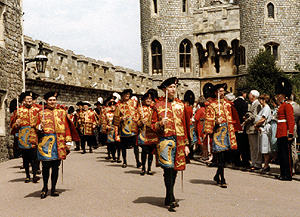 The Heralds preceding
the procession
The Heralds preceding
the procession
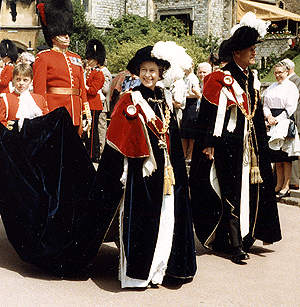 HM The Queen
with The Duke of Edinburgh
HM The Queen
with The Duke of Edinburgh
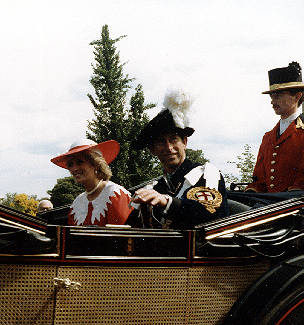 After the Garter
Service, Prince Charles and Diana, Princess of Wales
After the Garter
Service, Prince Charles and Diana, Princess of Wales
return to the State Apartments in an open Ascot Landau
Pictures from 1980
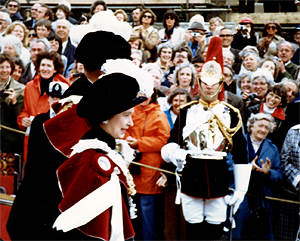 The Queen passes by in the Garter
Procession of 1980
The Queen passes by in the Garter
Procession of 1980
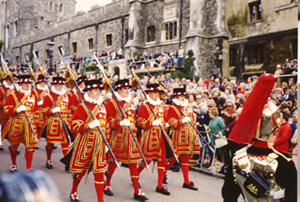 The Yeoman of the Guard in Procession
to St George's Chapel
The Yeoman of the Guard in Procession
to St George's Chapel
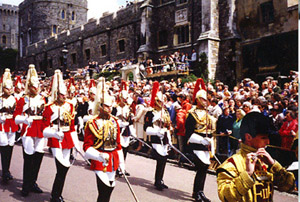 The Sovereign's Escort - The
Household Cavalry
The Sovereign's Escort - The
Household Cavalry
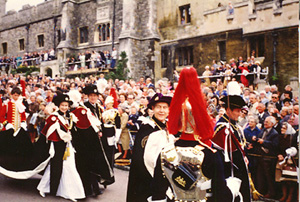 The Queen and the Duke of Edinburgh
The Queen and the Duke of Edinburgh
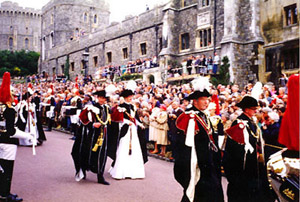
Garter Knights and Ladies
of the Garter in recent years
Announcements of the
creation of new Garter Knights always takes place on St George's
Day, 23rd April. In 200, the Queen
appointed Prince William as a Royal Knight Companion of the Most
Noble Order of the Garter. Prince William becomes the 1000th
Knight in the Register. The Queen also appointed Lord Luce, GCVO,
DL and Sir Thomas Dunne, KCVO, to be Garter Knights. Lord Luce
was Lord Chamberlain from 2000 to 2006. Sir Thomas Dunne has
been Lord-Lieutenant of Hereford since 1977 and Chairman of the
Lord Lieutenants Association.
Members of the Royal family are additional
to the established number of 24 Companions. The Duke of Edinburgh
was created a Knight in 1947 by King George VI, The Prince of
Wales in 1958, The Duke of Kent in 1985, The Princess Royal in
1994, The Duke of Gloucester in 1997 and Princess Alexandra in
2003. The Duke of York and The Earl of Wessex were both created
Knights in 2006.
The appointment of the Knights and Ladies of the
Garter is in The Queen's gift (i.e. without Prime Ministerial
advice). Appointments to the Order of the Garter are therefore
in the same category as the Order of the Thistle, the Order of
Merit and the Royal Victorian Order which are also in The Queen's
gift. Today's announcement brings the number of Companion Knights
to the maximum number of 24.
The new Knights will be invested in a private ceremony
in Windsor Castle and then process to St George's Chapel for
the Garter Service on Monday 16th June 2008.
HM Queen Elizabeth
HRH The Duke of Edinburgh 1947
HRH The Prince of Wales 1958
HRH The Grand Duke Jean of Luxembourg 1972
HM Queen Margrethe of Denmark 1979
HM King Carl Gustaf of Sweden 1983
HRH The Duke of Kent 1985
HM King Juan Carlos of Spain 1988
HM Queen Beatrix of the Netherlands 1983
HRH The Princess Royal 1994
The Duke of Gloucester 1997
The Emperor of Japan 1998
HM King Harald of Norway 2001
HRH Princess Alexandra, The Hon. Lady Ogilvy 2003
The Duke of Grafton 1976
The Lord Richardson of Duntisbourne 1983
The Lord Carrington 1985
The Lord Callaghan of Cardiff 1987 (D. 26 March 2005)
The Duke of Wellington 1990
Field Marshal the Lord Bramall 1990
Sir Edward Heath 1992
The Viscount Ridley 1992
The Lord Sainsbury of Preston Candover 1992
The Rt Hon Sir Ninian Stephen 1994
The Lord Kingsdown 1994
The Lord Ashburton 1994
The Baroness Thatcher 1995
Sir Timothy Colman 1996
The Duke of Abercorn 1999
Sir William Gladstone, Bt 1999
Field Marshal The Lord Inge 2001
Sir Antony Acland 2001
The Duke of Westminster 2003
The Right Honourable Lord Butler of Brockwell 2003
The Right Honourable Lord Morris of Aberavon 2003
Thomas Henry Bingham, The Lord Bingham of Cornhill, PC. Former
Lord Chief Justice 2005
John Major, CH, PC. Former Prime Minister. 2005
Lady Mary Soames 2005
HRH The Duke of York 2006
HRH The Earl of Wessex 2006
Garter Service 1914
George V
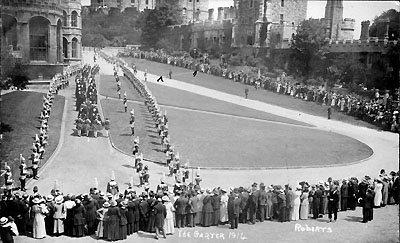
In 2002 we came across this photograph
of the royal party returning to the Upper Ward following the
Garter Service of 1914. In this year three Garter Knights were
created, Christian X, King of Denmark (1870-1947), William (Lygon),
7th Earl Beauchamp, Lord President of the Council and Albert
I, King of the Belgians (1875-1934).
The interesting feature is that so few members of
the public were present. Towards the end of the 20th century
thousands of spectators lined the route, totally filling all
the lawn areas, yet in those days the crowd was hardly more than
than 2-3 deep. Even in the 1950s and 60s, it was essential to
start queuing quite early in the morning, perhaps as early as
8.00am, in order to secure a good viewing position in the Lower
Ward, even though the procession to St George's Chapel was not
due to pass until the early afternoon.
This card was sent by Annie White to her friend or
relation, Evaline, and mentions Ted, presumably Annie's husband,
and Clara, presumably her daughter. The marks on the photo, upper
centre, show where Annie and her daughter watched the procession!
After 1914 there was no Garter Procession or service
for 23 years until George VI reinstated the ceremony in 1937.
Below we reproduce a photograph of the two young princesses,
Elizabeth and Margaret, walking down to the Chapel on June 14
of that year. Time magazine reported that they
were wearing pink and that The Duke of Connaught, at age 87,
was not able to attend the service, but watched the procession
from a car. Also absent was The Duke of Windsor, the former Edward
VIII, who had abdicated the throne just seven months earlier.
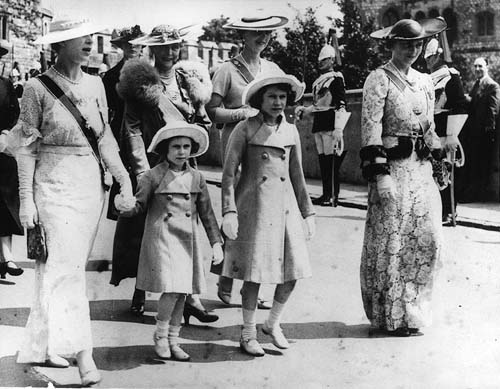 Left to right:
The Princess Royal, Princess Margaret Rose, Princess Elizabeth,
(later Queen Elizabeth II), The Duchess of Gloucester. Behind
are Princess Alice,Countess of Athlone, and the Duchess of Kent
Left to right:
The Princess Royal, Princess Margaret Rose, Princess Elizabeth,
(later Queen Elizabeth II), The Duchess of Gloucester. Behind
are Princess Alice,Countess of Athlone, and the Duchess of Kent
A note about the weather.
Spare a thought for the Lifeguards
in their heavy metal breast plates, and the guardsmen in the
bearskins, lining the route. They are required to stand for several
hours in the hot sun in mid-June. I myself have seen guardsmen
fall to the ground through heat exhaustion as they stand motionless.
The Royal Windsor Web Site will
report all events such as these and provide a permanent record
together with references to the background of such events wherever
possible.
Any
information or additional material about Windsor is always welcomed
and acknowledged.
Copies of photographs or texts
can be emailed to the Editor,
The Royal Windsor Web Site

To contact us, email Thamesweb.
|

